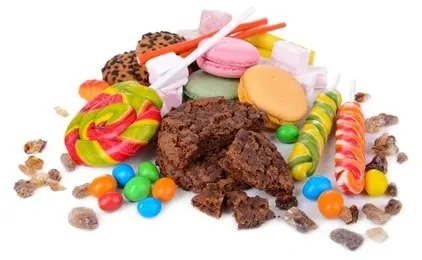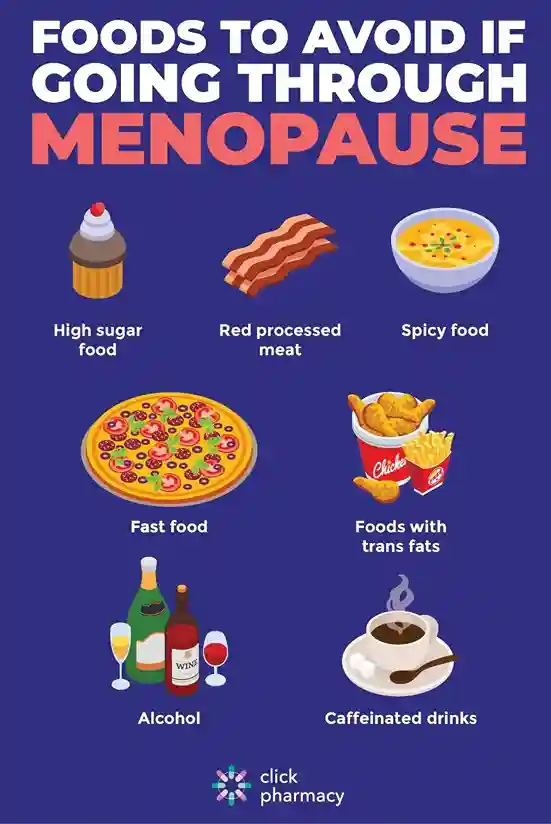
Authored by Jana Abelovska - GPhC-Registered Pharmacist
06-12-2024
From physical symptoms like hot flushes and joint pain to psychological symptoms like mood swings, menopause symptoms are often uncomfortable, painful and distressing. There are a few different ways that people choose to manage their menopause symptoms, whether that’s by taking prescribed treatments like HRT, taking supplements, or seeing a therapist. Alongside these treatment methods, many women choose to make changes to their lifestyle, such as changing the way they exercise, or the foods they eat. Studies have shown that a person’s diet can have an effect on menopause symptoms, so we at Click Pharmacy have put together an analysis of some of the food groups that are most strongly associated with these symptoms.
High sugar foods

Foods and drinks that are high in sugar have been linked to a few common menopause symptoms.
Firstly, many women become more insulin resistant during menopause, which has the effect that their bodies are less able to manage their blood sugar levels. So it’s important to be careful about the amount of sugar you’re consuming during menopause, as you might be more susceptible to hypoglycemia, or blood sugar crashes, which can make you feel tired and low in energy. Tiredness is a symptom that lots of women report experiencing during menopause anyway, partly due to the negative effects on their sleep. Blood sugar levels changing throughout the day have also been connected by several studies to hot flushes.
Sugar is also a major contributor towards weight gain during menopause, as it’s high in calories without being filling.
Red and processed meat

Processed meats can be high in sodium. Menopause can make you more likely to experience high blood pressure, and high salt intake is another factor that can drive blood pressure higher. Also known as hypertension, it is a key risk factor for strokes and heart attacks.
Red meat, especially in processed forms such as sausage and bacon, can also be high in saturated fat. This means that it can drive your cholesterol up, increasing the risk of cardiovascular disease. Many women find that their cholesterol increases during menopause, so reducing the amount of saturated fat in your diet might help to limit these rising levels and protect your heart. Saturated fat is also a contributing factor in weight gain, so people who are looking to manage their weight can benefit from cutting down.
Spicy foods

Spicy foods have been linked to hot flushes, as well as to the related symptom of night sweats - hot flushes that happen at night and can interrupt your sleep and leave your sheets and nightwear feeling uncomfortably damp. So if you are going through menopause but would rather not give up your favourite spicy foods, even having them for lunch instead of for an evening meal could help.
Trans fats

Also known as trans-unsaturated fatty acids, these fats are found naturally in some foods, namely animal products like butter, but they are also often added to foods. These ingredients are used because they are cheaper to produce than other fats, and can stay solid at room temperature, making them highly convenient - you can find trans fats in many baked goods, fried foods and restaurant meals. However, trans fats increase the risk of heart disease by 21% as well as the risk of death by any cause by 34%. The World Health Organisation set a target for food producers worldwide to phase out the use of industrially produced trans fats by 2023, which was not met.
These ingredients raise LDL or ‘bad cholesterol’ while lowering HDL, also known as ‘good cholesterol’. Trans fats have also been linked to higher levels of inflammation in the body, contributing to menopause symptoms like joint pain. Women experiencing menopause may already experience more inflammation due to dropping estrogen levels. Hot flushes and night sweats may also be connected to inflammation.
Fast food

Fast food and takeaways are often high in sodium, trans fats, saturated fat and sugar - all ingredients we’ve highlighted earlier on in this report as being potentially risky for women in menopause.
There are a few ways to cut down on unhealthy ingredients in your takeaway, including swapping pepperoni on your pizza for vegetables or chicken. Indian food, one of the UK’s most popular foods for a takeaway dinner, has lots of healthier options - a tomato-based madras contains much less saturated fat than a creamy dish like korma.
Alcohol

Alcoholic drinks are a vasodilator, which means that they can affect your blood vessels widening and narrowing - which hot flushes and night sweats are thought to be caused by or connected to. Cutting back on alcoholic drinks might help you sleep better too, especially if you avoid having a drink late at night before going to bed.
Caffeine

Caffeine is another vasodilator, meaning that women who are experiencing menopause might want to cut down on the amount of coffee and other caffeinated beverages they drink. It’s also worth noting that caffeine can increase feelings of anxiety, by mimicking physical symptoms like a racing heart rate and sped up breathing. Many women find that during the menopause, they develop anxiety or mood problems, or if they already experience this, they might find that it worsens at this time.

Foods that can help with menopause symptoms
There are also lots of healthy foods that may be able to help reduce menopause symptoms.
Did you know that Vitamin D is important for healthy bones? Vitamin D has become a high profile vitamin in recent years, with research connecting it to the immune system, but it also works together with calcium to keep bones and teeth healthy. Women in menopause are at an increased risk of osteoporosis due to falling estrogen, especially if they are not taking HRT. Mushrooms and oily fish are good sources of this vitamin.
Oily fish are also a great source of omega-3, which is important for heart health and lowering bad cholesterol or HDL. Omega-3s can also reduce inflammation in the body, which might also help people in menopause reduce the amount of joint pain they experience. Vegetarian sources of omega-3 include algae supplements as well as nuts and seeds such as walnuts and flaxseeds.
HRT for menopause
Many women choose to use hormone replacement therapy to help them through menopause, alongside lifestyle changes like diet and exercise. If you are experiencing menopause symptoms and you are considering HRT, we have a range of treatments available. Simply fill in the medical assessment and we will check which medicine might be the best option for you.